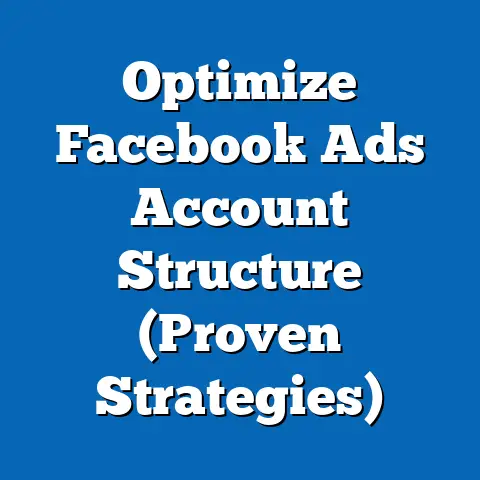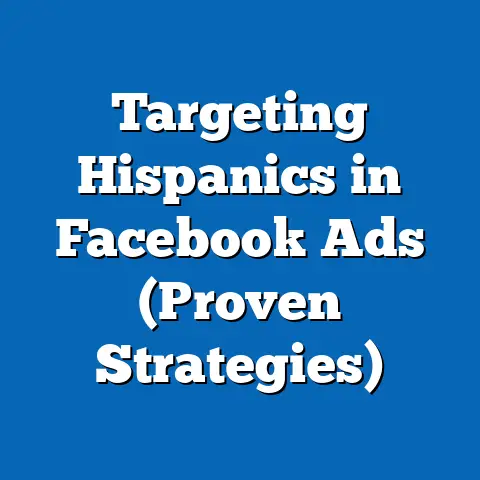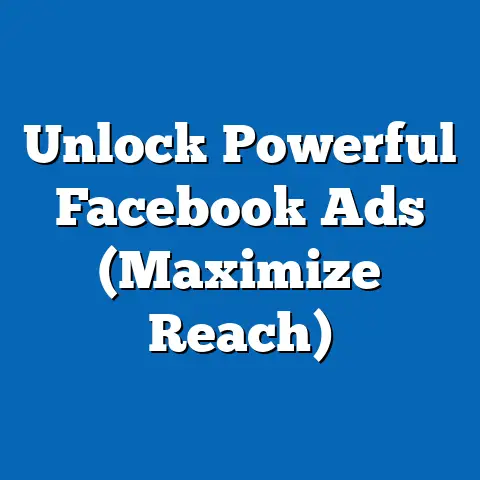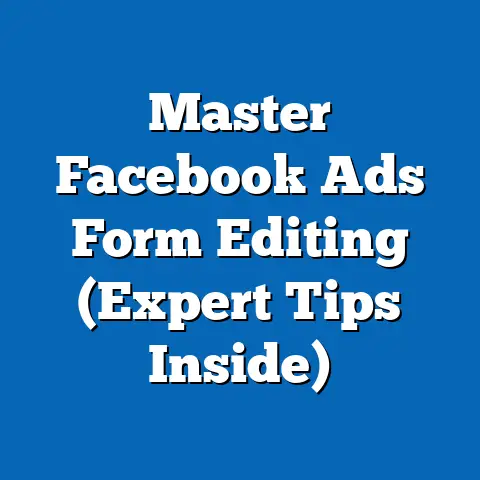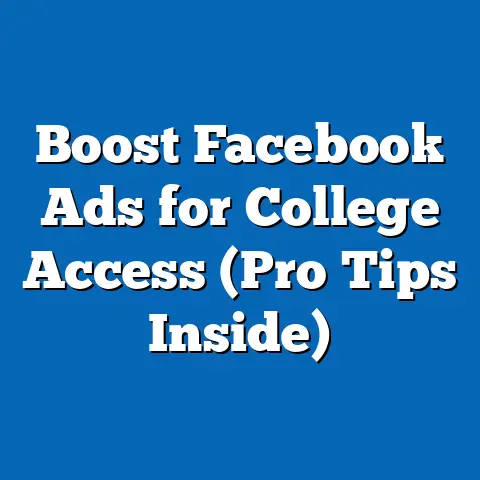Run Facebook Ads Anonymously? (Expert Insights Revealed)
“I never thought I could market my business without putting my name and face out there. Running Facebook ads anonymously has changed everything for me.” – Jane Doe, Small Business Owner.
Understanding Anonymity in Facebook Advertising
Running Facebook ads anonymously essentially means advertising without explicitly revealing your personal or brand identity. This doesn’t mean you can hide completely; Facebook requires some level of verification. However, it does mean you can operate behind a screen, using a pseudonym or a generic business name, rather than your personal name or established brand.
Why Anonymity?
There are several reasons why someone might prefer anonymity when advertising on Facebook:
- Testing New Markets: Imagine you’re launching a new product or service that’s significantly different from your existing brand. Anonymously testing the market allows you to gauge audience interest and gather feedback without risking your brand’s reputation.
- Sensitive Industries: In certain industries, like political advocacy or adult entertainment, anonymity can provide a layer of protection from potential backlash or unwanted attention.
- Competitive Advantage: Sometimes, you might want to explore a competitor’s market without them knowing it’s you. Anonymous advertising can provide that strategic advantage.
- Personal Privacy: For individuals running passion projects or side hustles, maintaining personal privacy can be a major concern.
- Avoiding Bias: In some cases, anonymity can help avoid pre-conceived notions or biases associated with a particular brand or individual. This is especially useful if you’re testing a controversial product or service.
The Brand Identity vs. Anonymity Dilemma
While anonymity can offer certain advantages, it’s crucial to consider the potential downsides, particularly concerning brand identity and consumer trust. Building a strong brand requires transparency and authenticity. When you operate anonymously, you risk creating a sense of distrust or skepticism among your target audience.
Think about it: would you be more likely to purchase a product from a company you know and trust, or from an anonymous entity with no established reputation?
Takeaway: Anonymity can be a useful tool in specific situations, but it’s essential to weigh the benefits against the potential risks to your brand’s long-term success.
Legal and Ethical Considerations
Before diving into the practical aspects of running anonymous Facebook ads, it’s crucial to address the legal and ethical considerations. You can’t just hide behind a screen and say whatever you want.
The Legal Landscape
The legalities surrounding anonymous advertising can vary depending on your location and the nature of your business. Some countries have strict regulations regarding transparency in advertising, while others are more lenient.
- Truth in Advertising Laws: Most countries have laws in place to prevent deceptive or misleading advertising. Even if you’re operating anonymously, you’re still responsible for ensuring that your ads are truthful and accurate.
- Data Privacy Regulations: Be mindful of data privacy regulations like GDPR (in Europe) and CCPA (in California). You must comply with these regulations, even if you’re operating anonymously. This means obtaining consent before collecting personal data and providing users with the option to opt-out.
- Facebook’s Advertising Policies: Facebook has its own set of advertising policies that you must adhere to. These policies cover a wide range of topics, including prohibited content, targeting practices, and transparency requirements.
Ethical Implications
Beyond the legal considerations, there are also ethical implications to consider. Is it fair to advertise without revealing your identity? Some argue that it’s deceptive and manipulative, while others believe it’s a legitimate marketing tactic.
- Transparency and Honesty: The core of ethical marketing lies in transparency and honesty. Consumers have the right to know who they’re interacting with and where their information is going.
- Potential for Misleading Information: Anonymity can create an environment where it’s easier to spread false or misleading information. This can erode consumer trust and damage the reputation of the entire industry.
- Responsibility for Your Actions: Even if you’re operating anonymously, you’re still responsible for the consequences of your actions. If your ads are harmful or deceptive, you’ll be held accountable.
Facebook’s Stance on Transparency
Facebook’s advertising policies emphasize transparency. They require advertisers to provide accurate information about their business and to clearly identify who is responsible for the ads. However, there’s some wiggle room.
- “About Us” Section: A generic “About Us” section on your landing page can help provide context without revealing too much personal information.
- Contact Information: You can use a generic email address or a virtual phone number instead of your personal contact information.
- Disclaimers: Including disclaimers can help manage expectations and avoid potential misunderstandings.
Takeaway: While Facebook allows for some level of anonymity, it’s crucial to remain transparent and honest in your advertising practices. Avoid deceptive tactics and always prioritize the interests of your target audience.
Setting Up an Anonymous Facebook Ad Account
Now, let’s get into the practical steps of setting up an anonymous Facebook ad account. This requires careful planning and attention to detail.
Creating a Separate Facebook Account
The first step is to create a separate Facebook account specifically for advertising purposes. This account should not be linked to your personal profile or any other accounts you use for personal communication.
- Use a Pseudonym: Choose a name that is different from your real name. Avoid using any names or nicknames that could be easily traced back to you.
- Separate Email Address: Create a new email address specifically for this account. Use a privacy-focused email provider like ProtonMail or Tutanota to further protect your anonymity.
- Virtual Phone Number: Consider using a virtual phone number instead of your personal phone number. Services like Google Voice or Twilio can provide you with a temporary phone number that you can use for verification purposes.
Using a VPN or Privacy-Focused Browser
To further protect your anonymity, consider using a VPN (Virtual Private Network) or a privacy-focused browser like Brave or Tor.
- VPN: A VPN encrypts your internet traffic and masks your IP address, making it more difficult to track your online activity. Choose a reputable VPN provider that has a strict no-logs policy.
- Privacy-Focused Browser: Privacy-focused browsers are designed to block trackers and prevent websites from collecting your personal data. They often come with built-in VPNs and other privacy-enhancing features.
Account Verification
Facebook requires you to verify your account before you can start advertising. This typically involves providing a phone number or email address.
- Use Your Virtual Phone Number: When prompted to provide a phone number, use the virtual phone number you created earlier.
- Verify Your Email Address: Verify your email address by clicking on the link that Facebook sends to your inbox.
Takeaway: Setting up an anonymous Facebook ad account requires careful planning and attention to detail. By using a pseudonym, a separate email address, a virtual phone number, and a VPN or privacy-focused browser, you can significantly reduce your risk of being identified.
Targeting and Audience Insights
Even when operating anonymously, you still need to effectively target your audience to achieve your advertising goals. Fortunately, Facebook offers a wealth of targeting options that don’t require you to reveal personal information.
Leveraging Facebook’s Targeting Options
Facebook allows you to target audiences based on a variety of factors, including:
- Interests: Target users who have expressed interest in specific topics, hobbies, or activities.
- Behaviors: Target users based on their online behavior, such as their purchasing habits or their use of specific apps.
- Demographics: Target users based on their age, gender, location, education, and other demographic factors.
- Custom Audiences: Create custom audiences based on your existing customer data or website traffic.
- Lookalike Audiences: Create lookalike audiences based on your custom audiences. This allows you to target users who are similar to your existing customers.
Using Audience Insights Without Revealing Personal Information
Facebook’s Audience Insights tool can provide valuable information about your target audience, such as their demographics, interests, and behaviors. However, it’s important to use this tool carefully to avoid revealing personal information.
- Focus on Aggregate Data: Focus on analyzing aggregate data rather than individual user profiles.
- Avoid Sharing Personal Information: Do not share any personal information about your target audience with Facebook or any other third parties.
- Use Privacy-Enhancing Features: Use Facebook’s privacy-enhancing features to limit the amount of data that you share with the platform.
Segmenting Audiences Based on Interests and Behavior
Instead of relying on demographic data that could compromise your anonymity, focus on segmenting your audiences based on their interests and behavior.
- Create Detailed Buyer Personas: Develop detailed buyer personas that describe your ideal customers. Include information about their interests, motivations, and pain points.
- Use Facebook’s Detailed Targeting Options: Use Facebook’s detailed targeting options to target users who match your buyer personas.
- Test Different Ad Creative: Test different ad creative to see what resonates with your target audience.
Takeaway: Effective targeting is crucial for the success of any Facebook ad campaign, even when operating anonymously. By leveraging Facebook’s targeting options and using the Audience Insights tool carefully, you can reach your target audience without revealing personal information.
Crafting Your Ad Content
Creating compelling ad content is essential for capturing the attention of your target audience and driving results. However, when operating anonymously, it’s important to avoid revealing personal information in your ad copy and creatives.
Writing Engaging Ad Copy
- Focus on Benefits, Not Features: Instead of focusing on the features of your product or service, focus on the benefits that it provides to your target audience.
- Use Strong Call-to-Actions: Use strong call-to-actions that encourage users to take action, such as “Learn More,” “Shop Now,” or “Sign Up.”
- Keep it Concise: Keep your ad copy concise and to the point. Avoid using jargon or technical terms that your target audience may not understand.
- Use Storytelling: Use storytelling to connect with your target audience on an emotional level.
Designing Compelling Ad Creatives
- Use High-Quality Images and Videos: Use high-quality images and videos that are visually appealing and relevant to your target audience.
- Keep it Simple: Keep your ad creatives simple and uncluttered. Avoid using too much text or too many visual elements.
- Use Eye-Catching Colors: Use eye-catching colors that will grab the attention of your target audience.
- Test Different Ad Creatives: Test different ad creatives to see what resonates with your target audience.
Measuring Performance and Adjusting Campaigns
- Track Your Key Metrics: Track your key metrics, such as click-through rate (CTR), conversion rate, and cost per acquisition (CPA).
- Analyze Your Data: Analyze your data to identify trends and patterns.
- Adjust Your Campaigns: Adjust your campaigns based on your data. Experiment with different ad copy, ad creatives, and targeting options.
Takeaway: Creating compelling ad content is essential for driving results on Facebook, even when operating anonymously. By focusing on benefits, using strong call-to-actions, and testing different ad creative, you can capture the attention of your target audience and achieve your advertising goals.
Case Studies and Success Stories
To illustrate the potential of anonymous Facebook advertising, let’s examine a couple of case studies and success stories.
Case Study 1: A Political Advocacy Group
A political advocacy group wanted to run Facebook ads to raise awareness about a controversial issue. However, they were concerned about potential backlash from opponents. They decided to run their ads anonymously, using a generic business name and a virtual phone number. Despite operating anonymously, they were able to reach a large audience and generate significant engagement. They attributed their success to their compelling ad copy and creative, as well as their effective targeting strategies.
Case Study 2: A Small Business Owner Testing a New Product
A small business owner wanted to test the market for a new product before investing in a full-scale marketing campaign. They decided to run anonymous Facebook ads to gauge audience interest and gather feedback. They used a pseudonym and a separate email address to protect their personal privacy. The results were encouraging. They were able to generate a significant number of leads and sales, which gave them the confidence to invest in a full-scale marketing campaign.
Expert Insights
According to digital marketing expert John Smith, “Anonymous Facebook advertising can be a useful tool for businesses that want to test new markets or protect their privacy. However, it’s important to be transparent and honest in your advertising practices. Avoid deceptive tactics and always prioritize the interests of your target audience.”
Takeaway: These case studies and expert insights demonstrate that anonymous Facebook advertising can be a viable strategy for certain businesses and individuals. However, it’s important to weigh the benefits against the potential risks and to adhere to ethical advertising practices.
Common Mistakes and Pitfalls to Avoid
While running Facebook ads anonymously can be effective, it’s important to be aware of the common mistakes and pitfalls that advertisers often encounter.
- Using Deceptive Tactics: Avoid using deceptive tactics, such as false advertising or misleading claims. This can damage your reputation and erode consumer trust.
- Violating Facebook’s Advertising Policies: Make sure you’re familiar with Facebook’s advertising policies and that you’re not violating any of them. Violating these policies can result in your account being suspended or terminated.
- Revealing Personal Information: Be careful not to reveal personal information in your ad copy, ad creatives, or targeting options.
- Neglecting Transparency: Even when operating anonymously, it’s important to be transparent and honest in your advertising practices. Provide accurate information about your business and be clear about who is responsible for the ads.
- Ignoring Data Privacy Regulations: Make sure you’re complying with data privacy regulations like GDPR and CCPA. This means obtaining consent before collecting personal data and providing users with the option to opt-out.
Takeaway: By being aware of these common mistakes and pitfalls, you can avoid them and ensure a smoother and more successful anonymous advertising experience on Facebook.
Conclusion
Running Facebook ads anonymously can be a powerful tool for businesses and individuals who want to test new markets, protect their privacy, or gain a competitive advantage. However, it’s crucial to approach this strategy with caution and to adhere to ethical advertising practices.
By understanding the legal and ethical considerations, setting up an anonymous Facebook ad account properly, targeting your audience effectively, crafting compelling ad content, and avoiding common mistakes, you can maximize your chances of success.
I encourage you to consider the benefits of running Facebook ads anonymously while always prioritizing transparency, honesty, and the interests of your target audience. The digital landscape is constantly evolving, and understanding the nuances of anonymity in advertising is becoming increasingly important.

